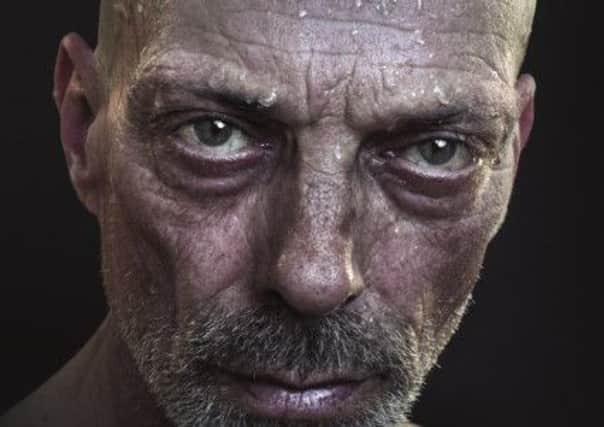A moving tragedy


No English teacher ever mentioned naked witches in Macbeth, or Nazi storm troopers in Hamlet. But at the Citz, there they were. Anything seemed to go so long as it challenged the status quo. It certainly got schoolboys in the door.
I don’t think there will be naked witches in Scottish Opera’s revival of Verdi’s famous operatic version of Macbeth, a scaled-down production by Citizens’ Theatre artistic director Dominic Hill that first saw the light of day in Dundee back in 2005, when Hill was resident artistic director at Dundee Rep. But this new revival – which expands the original piano-only accompaniment to small orchestra (still very much a reduction of Verdi’s large orchestral scoring), and opens with a short Glasgow run at the Citizens,’ beginning next Saturday, before transferring to the King’s Theatre in Edinburgh for two performances on 8 and 10 April – was conceived with an interesting twist.
Advertisement
Hide AdThe setting, says Hill, is “vaguely contemporary”. “That doesn’t mean it’s kind of mobile phones and videos and stuff. It’s got a sort of Balkans feel to it, sort of totalitarian.” Which is exactly the kind of powerful approach Tim Albery later took when setting his 2008 Opera North production of Verdi’s first Shakespeare opera in an unnamed mid-20th century totalitarian state where power is all and intimacy is soiled by corruption and violence.
The obvious difference for Hill is that he has attempted to capture the work’s epic intensity within the intimate context of a smaller stage and without the full atmospheric charge of Verdi’s expansive orchestration. How much of a challenge did he find that to be?
“The advantage of doing it small scale, I guess, is that it becomes a much more domestic piece, essentially about the relationships between the characters,” he says. “And by trying to be as detailed as you can in terms of the psychological approach, you’re very much concentrating on the story of the central relationship between the Macbeths.
“I guess it’s just about honing it all down to the drama that exists between the characters, which is the best way to look at it when you’ve got a setting that is deliberately confined and claustrophobic.”
It’s true that Hill has slightly more room to play with at the Citizens’ than he did originally in Dundee. It has, he says, opened up more possibilities, but not to the extent of significantly altering his original thinking.
“I always felt it was a production that in some ways was slightly bigger than a small-scale production at its best,” he explains. “It always felt it could take more than just a piano, so it’s nice we’ve been able to do the same production but with a small orchestra. That way it feels like there’s still a sort of epicness to the story, especially those large choral moments. It’s really great to be able to expand all that into a decent space.”
Advertisement
Hide AdThis is only Hill’s second opera production; both, as it happens, Shakespearean operas by Verdi. The other was a lusty, full-scale Falstaff for Scottish Opera in 2008. But he’s taken to opera like a duck to water. “For me the process is pretty much the same,” he says.” You’re trying to find out why characters sing the things they sing, and to explore the relationships and the motivations.
“But what’s wonderful about opera is that the music does so much of the work for you. There’s something I enjoy about that being prescribed, and how in some ways the difference between Shakespeare and Verdi is that you’re simply replacing poetry with music. That’s different, but equally effective, in terms of what it does to an audience.”
Advertisement
Hide AdVerdi, himself, was a man who understood the theatre, who considered Shakespeare’s Scottish play to be “one of mankind’s greatest creations”, and who considered stagecraft in opera to be as vital a component as the words and music.
Yet his real theatrical genius, says Hill, “was his ability to expand the drama of the dialogue, through song, into something that’s more revelatory about what the characters are thinking, what they’re trying to do. I’ve always felt he had a sense of theatre, like when you read some of his original directions to the singers for original productions; they’re like a theatre director’s.”
As for Hill’s cast, he says they’re “a terrific bunch of people”, especially the experienced British soprano Elisabeth Meister as Lady Macbeth. “She absolutely threw herself into it,” he says. “And that’s such a strong role, probably more than in the play, in the way she instigates what happens.”
And why set it in the Balkans? “That came partly from the fact that one of the big changes in the opera is that Verdi made it much more Christian, whereas the play is not really Christian at all. We were trying to find a world which had all the elements of the play, but could embrace Catholic colour as well. Therefore those orthodox countries seemed to fit quite well. I’m not saying this is a play set in Serbia, but there is a sense of that.”
In that respect, is it possible the current Ukraine crisis might resonate with this production. “Yes,” he says. “That’s an interesting thought, and quite a disturbing coincidence.”
• Scottish Opera’s production of Verdi’s Macbeth opens a the Citizens’ Theatre, Glasgow on 22 March (0141-429 0022, and at the King’s Theatre, Edinburgh on 8 April (0131-529 6000)